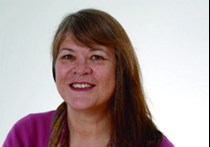Celebrating talent and tenacity on International Women’s Day

We strive to create an environment where everyone feels respected, valued and empowered to achieve their full potential.
With this in mind, we’re celebrating International Women’s Day and marking the annual call for action to improve gender balance, first announced in 1911, with the support of over a million people.
Gender balance is an aspiration that will benefit us all, male and female, improving relationships, the economy and welfare. And as a result, has many male supporters.
To shine a light on the great work being done every day by inspirational women working in our services, we’re sharing some of their stories to hearten, encourage and motivate. Serving as a reminder of what can be achieved, even when circumstances can be challenging.
 |
A passion for people on International Women’s DayWe talk to Bev Searle, our Director of Strategy and Corporate Affairs, about how people are the focus of our corporate strategy |
Beginning her career as an occupational therapist, Bev, has experience working in mental health, substance misuse, care management for older people and children, has been a lecturer and worked in social services and housing.
As Director of Strategy and Corporate Affairs she oversees a large portfolio, which sees her working on a daily basis developing strategy, working on project management, human resources, marketing and communications and business development, as well as leading the organisation in its equality, diversion and inclusion strategy. Bev is also the executive lead on our Freedom To Speak Up initiative.
She says: “I have a really varied role working in the Trust and with partner organisations – there are lots of opportunities to have an impact on the care we provide to patients by supporting our front line staff and working in a joined up way in the community”
“Our executive and board meetings are really focused on our goals as an organisation. We are committed to making this a great place to work and I enjoy coaching and mentoring inside and outside of the organisation. We have some very talented women that sometimes need some support to help them progress and realise just how good they are. Research suggests that women can be reluctant to come forward. It is important that they are encouraged, their talents recognised and that they flourish and enjoy a fulfilling career.”
Bev’s motivation is all about making a difference to patients and to staff. She says: “I started training 41 years ago. It is a massive privilege to work with incredible people and being able to make a difference to people’s lives. I also like being able to enable employees and try to remove the barriers that get in their way.”
When faced with challenges Bev says: “I try to think through what is the right thing to do based on our core values. You can’t know everything, so you have to rely on the values to guide you. I try to listen before I leap in. It is important to understand what people are telling you.”
In such a demanding role, what keeps Bev inspired and motivated is hearing about progress in the lives of our patients and employees. She says: “Our board meetings always start with videos of our services or a patient story. I think that is really important so that we can see the impact we are making, how we can help with the challenges that staff are experiencing, and are connected to the great work that our teams are doing.”
Working in the NHS for over 30 years and in many hospitals and community services as an occupational therapist all over the country, Alison qualified in Wolverhampton and then initially worked in America with the national Cerebral Palsy Society.
She says: “I’ve worked in both mental health and learning disability services and enjoyed all aspects of my varied clinical career.”
After taking time away from her career to have children, Alison was eager to come back to the profession and has worked with us for 11 years.
She explains: “I joined initially as the Allied Health Professional Lead when we were a mental health trust and remained in the same role when we merged with a community trust. I have also been privileged to hold some corporate roles and enjoyed helping and supporting Helen Mackenzie, our then Director of Nursing and Governance, during the period of our first comprehensive CQC inspection in 2015. I have to say it was the most exhausting work I have ever done, but it was fantastic!”
Alison then went on to lead our agency programme, developing our bank staff service and transforming the way we employ high quality and flexible workers, in partnership with NHS Professionals.
She has now been the Divisional Director at Prospect Park Hospital for just over two years.
She says: “My job involves leading the senior leadership team at the hospital, with the aim of delivering the best quality care we can for people with mental health problems, who are in patients in our wards.”
Talking about what motivates her in this demanding role, she says: “Always knowing that we can provide a good quality service to our patients and their carers, and helping them on the road towards recovery.”
“We’re leading with some really exciting new ways of working with IT systems and developing new ways of working with our patients. Seeing these in action, and observing how our patients benefit from these, always helps me carry on, and, importantly, I get to lead some fantastic staff. I have a great senior leadership team and we support each other and help each other to tackle the various challenges that we face.”
“We have a meeting each morning – our ‘daily summit’ - to reflect on what has happened the day before and what might be happening in the day ahead. I fervently believe that many heads are better than one. If this fails and I am still mulling problems around when I get home, a good sociable hour of Zumba, a game of tennis or some intricate gardening will often help me puzzle things out.”
Alison concludes: “I’ve been in the NHS over 30 years and truly believe in it and the values it stands for. My family often say that I am NHS to the core. I believe in its core values and those of Berkshire Healthcare. This keeps me going. If I didn’t enjoy it, then I wouldn’t do one of the most stressful jobs in the Trust.”
 |
Changing lives through compassionate careConsultant psychologist, Deborah Lee, explains how compassion has been her driving force in transforming care for people suffering from trauma |
Deborah trained as a clinical psychologist at the Institute of Psychiatry and has been qualified for 27 years. She began her career working with Deaf children, before moving into research on treatment for trauma, at the first trauma clinic in the UK, which was opened in the aftermath of the King’s Cross Fire (a tragic event that took place on 18 November 1987, on the London Underground, when a fire started under a wooden escalator serving the Piccadilly line, killing 31 people and injuring 100.
Deborah went on to help establish the first NHS clinical service in the country to treat Post Traumatic Stress Disorder, before moving to the Oxford Cognitive Therapy Centre. She then came to Berkshire Healthcare to head our Traumatic Stress Service in 2007.
Deborah says: “I have spent 16 years developing compassion focused therapy as an approach to treat shame-based Post Traumatic Stress Disorder and continues this work within Berkshire Healthcare. For the last three years, I have had the great pleasure of working to promote compassion and to develop our Compassionate Leadership Programme. We now have the largest compassionate leadership programme in the country and our research is quoted at national and international Healthcare Leadership Conferences.”
Deborah runs our Trauma and Veteran Services, helping people recover from distressing and life-changing traumatic events. When I ask what motivates her, she answers “Passion”. Continuing: “I absolutely love my job. I feel so motivated and inspired by the patients I work with and it’s a privilege to be able to help those hurt by life to learn, through compassion, to flourish again. I feel passionate that people should be allowed to live the lives they want for themselves and not the traumatised life that has been shaped and limited by how others have treated them.”
When it comes to tackling work challenges, Deborah says: “Lots of tricky situations at work result from people not behaving as their best version of themselves. In difficult situations, I always try to remember that I want to be helpful, not harmful and it helps me to think of what works for the greater good of the service users, team and the Trust. We all need to bring our best versions of ourselves to work so that we can all benefit and support each other.”
She concludes: “The kind of work that I do is a privilege and I am fortunate to work with a lovely, inspirational team, who are committed to helping people in distress. I like this quote, ‘there is no better life to lead than one dedicated to helping others’ and that is what everyone here does, every day, in some way.”
 |
Putting people firstWe ask Claire Williams, Locality Director of Community Adult Health Services – East, about her motivation and inspiration |
Claire Williams was one of the first students to qualify with a physiotherapy degree when it was first offered at The Royal London Hospital.
She recalls: “When I travelled to London to take my place at university, it was the first time I had left Wales. I felt terribly homesick and cried all the time to begin with.’
Once qualified she moved even further east to work in the Norfolk & Norwich University Hospital, before falling in love and moving to South Africa.
“It was an eye-opener,” Claire says. “I was working in state hospitals where they had nothing like the kind of equipment and standards of service that we can offer here. Patients were lying in corridors, the wards were chaotic.”
After living in Brussels, where she was unable to work due to EU regulations, Claire moved to Berkshire and took a four-year career gap to have children and came back to work with a whole new perspective.
She explains: “I came back fresher. There was a different balance and perspective in my life. My boys were aged four and three and for that reason, I decided to move into management, as I didn’t want to be in the position that I might have to cancel a clinical appointment if one of my children was ill, for example.”
Claire later moved into podiatry and working with people with learning disabilities.
She says: “I remember that it felt like a big step taking on podiatry when up to that point my focus had been on physiotherapy. But I quickly learnt that you don’t need to be a subject expert to manage a service. I had an early belief that has stood me in good stead as I have moved through my career and that is to look after the people you work with – make them feel valued and appreciated. They, in turn, will then do the same for the patients they care for. If you always do the right thing by the people you work with and the patients you look after, then you create a strong foundation to deliver good care.”
“As a manager, I know that if you care for people and treat them well, they will go the extra mile for you.”
On a day-to-day level, Claire is working with local partners in the acute hospitals, local authorities, CCGs and wants to develop Berkshire Healthcare’s Community Strategy, to ensure that we deliver the best service possible and have a strong reputation as a system leader in delivering community health services.
Claire says: “I believe in my team and developing a strong and cohesive group of people around me. What inspires me most is making a difference in patient care and developing the people in my team. I set boundaries but I don’t micromanage. People need space to grow.”
When it comes to tackling challenges Claire believes in working with others. She says: “I talk to people and I know that I am transparent and open. And I’m not defensive if challenged. I think it’s important to have good relationships and they have to be genuine. Our team makes plans together and if people are having difficulties we go back and see what we can do. It is important to have authentic relationships and helping people to keep on the right track. It’s also important that you take time to help others when they ask, be willing to support and re-prioritise your time.”
“I also think it’s important to choose your battles. People can be principled and be willing to win at any cost. But compromise and fairness are important – keep patients at the centre of your decision-making.”
“I am persistent in my endeavours – you need to be to really embed change. It’s the progress that I see in things like community nursing that inspires me. I refuse to get dragged down by negativity, such as political indifference, I like to see progress in people and our services.”
